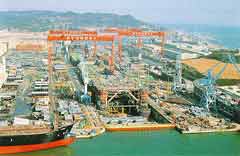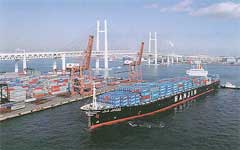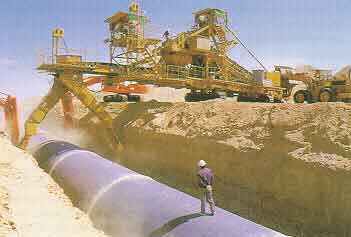| (1) Promotion of Economic
Development |
From the beginning of 1960,
after restoration of much of the damages from the Korean
War, a policy for full-fledged economic development was
promoted. The Third Republic, established through the
May 16 coup d' tat in 1961, was especially successful at
enforcing the framework for economic development through
a number of five-year economic programs.
The basic
direction of economic development at this time was to
build factories with foreign capital and to export goods
produced to foreign markets. This was an inevitable
method considering the reality of a country lacking in
natural resources and without capital and technology.
|
| |
 |
Korea
has been one of the World's
top
shipmakers. |
 | |
| |
Koreans participated
enthusiastically in the economic development policy
which was strongly promoted by the government. Thus, 20
years after the beginning of economic development, the
rapidly growing power of Korea became the focus of
attention worldwide. In particular, as the growth of
exports geometrically increased, Korea became an
important constituent in the world market.
Economic
development brought big changes in Korea's industrial
structure and to the lives of the people. The
backwardness in industry was overcome and an industrial
structure of an advanced nation was developed, with the
automotive and electronics industries at its
center.
At the same time, the daily lives of the
people were stabilized and the number of people who were
able to enjoy a life of leisure increased. Furthermore,
a network of roads was completed which connected the
entire country and made the whole nation into a one-day
traveling space. This has greatly contributed to
narrowing the differences in cultural standards of the
cities and farming villages. |
| |
| (2) Expansion of the
Saemaul (New Community) Movement |
In the early 70's, the
government developed the Saemaul (New Community)
Movement in order to modernize the farming and fishing
villages. This movement was created to awaken the people
and to improve their living standard through a spirit of
diligence, self-help and cooperation among farmers and
fishermen.
The government improved the living
conditions of the farming and fishing villages and with
positive responses from farmers and fishermen, their
living conditions and income standards rose
remarkably.
When the Saemaul Movement in the farming
and fishing villages began to show signs of success,
cities and factories also began to carry out some of the
same practices. In this way, the spirit of "My Homeland
And My Workplace Must Be Cared For By My Own Hands" was
implanted in the hearts of the people nationwide. This
has become the basis of Korea's social and economic
development. |
| |
| (3) Inroads Overseas by
Enterprises and Labor Force |
| As the economy developed
through the strong will of the people, Korea's
enterprises and labor force began to reach the nations
worldwide. Korea's trading enterprises have opened
branches in the important cities around the world, and
large domestic enterprises have established electronic
goods factories in the United States and Europe. Korea's
construction industry, in particular, with its
outstanding technology and reputation have made advances
into Southwest Asia, Africa, Southeast Asia and South
America, where they are actively engaged in various
construction projects. Korean workers and technicians
have also made inroads overseas and at one time exceeded
200,000 persons. |
| |
 |
In Lybia, a Korean construction
company has undertaken the awe-inspiring task of
connecting pipes into a water conduit running
about 1.870Km from Tazaerbo to
Sarir. | |
| |
| Agricultural and fishing
industries also made active advances abroad. Experts in
agricultural technology have not only been dispatched to
Africa to help agricultral developments there but
Korea's ships have made their way through the five
oceans where they are engaged in catching fish. The
reason why Korea's enterprises and labor force have been
able to make such advances into the world stage is
because Korea's power as a nation has progressed to such
a great extent. Thus, Korea is now in a position to give
assistance to others. Koreans can say that this bespeaks
of their generosity and the diligence of its people.
|
| |
| (4) Development of Korean
Societies Abroad |
The intelligence and
diligence of Koreans are manifested not only by people
at home but also by those residing in foreign countries.
The Korean societies which have sprung up during the 50
years since restoration in Japan, the United States,
China, and the Soviet Union have made steady
progress.
At present, there are approximately 700,000
Koreans residing in Japan. They are mostly the people
and their descendants who sailed there to find a means
of living or were forcibly taken there during the period
of Japanese colonization. The Korean residents in Japan
who have been discriminated against since the colonial
days have made their way advancing with patience and
diligence. They have thus built the social and economic
foundations for their lives which even the Japanese
cannot ignore and have proudly become a Korean society
which also contributes to the development of their
homeland.
The 1,800,000 Koreans who now reside in the
U.S. are composed mostly of people who immigrated since
restoration and their children.
They have overcome
the prejudice of a white-centered society with their
patience and fighting spirit and have courageously
obtained a secure life. Today, Korean communities exist
in many of the large cities in the United
States.
There are about 1,950,000 Koreans also living
in the area of Yuanbian in Jilin, China. These people
have formed their own autonomous district and manage all
aspects of government, economic, social, and cultural
activities through their own strength. There are also
460,000 Koreans residing in the central Asia area of the
former Soviet Union. These people originally resided in
the Maritime Province until they were forced to resettle
in central Asia by the Soviet Union in 1930. In spite of
this, however, they overcame this unfamiliar environment
with their strong wills and have now secured prosperous
lives for themselves.
In addition, Korean societies
are expanding to every part of the world. Today's Korean
societies are overcoming difficulties with their
outstanding abilities and will, and building a
reputation of proud Koreans. |
| | |